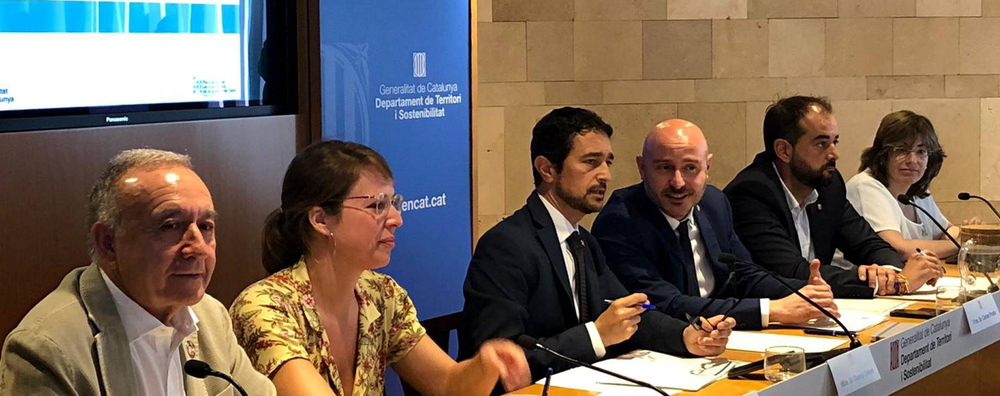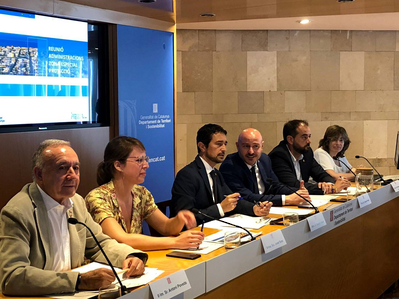- Key actors met today to discuss a European Commission decision to refer Spain to the Court of Justice of the EU for failing to respect limit values for nitrogen dioxide

The Minister for Territory and Sustainability, Damià Calvet, said today that public authorities responsible for air quality in the Barcelona conurbation (known as “Area 40”) are working hard to tackle the pollution problem: “We will continue working to improve air quality through measures such as the expansion of low-emission zones.” The minister said the new zones would be in addition to the existing low-emission zone between Barcelona’s ring roads. It is anticipated that these steps, which will come into effect in January 2020, will prevent the circulation in this area of up to 124,000 vehicles that do not have environmental badges issued by the Directorate-General for Traffic. The expanded low-emission area will be managed through the Metropolitan Area of Barcelona for municipalities in this area, with the support of the Metropolitan Transport Authority for other Area 40 municipalities.
The minister explained the planned measures after a meeting with representatives of Area 40 municipalities and other key actors, who discussed the implications of a European Commission decision to refer Spain to the Court of Justice of the EU for failing to respect limit values for nitrogen dioxide (NO2).
Speeding up implementation
Calvet said that in response to the infringement procedure launched by the European Commission, “We’ve periodically presented evidence of an improvement in air quality, and the number of stations where the limit values for nitrogen dioxide are exceeded has been reduced from 17 in 2010 to just two in 2018.” He added: “In January 2021, when we expect the court to issue a decision, we’ll be meeting the requirements in this area. That’s our roadmap.” According to the minister, compliance will be achieved by speeding up implementation of planned measures to tackle pollution, such as moving forward the deadlines for opening bus lanes on key motorways, a matter that must be formally agreed by the Catalan Ministry of Territory and Sustainability and the Spanish Ministry of Development, which must transfer the infrastructure and the financial allocation for its maintenance. Calvet said he expected the new bus lanes to be open by the end of the year. Other measures discussed include emissions-based parking charges, increasing public transport options, and the Catalan government’s mobility and infrastructure plans, which will improve air quality as well as transforming the high-performance road network.
Eurovignette-based approach to managing mobility
According to the minister, the Catalan government is working on a different approach to managing tolls and a management model based on the EU’s “Eurovignette Directive”. Calvet said: “We need a flat rate, and the revenue generated should be used to fund public transport, green vehicle fleets, and maintain express roads.” Just this week, the Working Group on the Integrated System for High-Performance Toll Roads, set up at the request of the Catalan Parliament, held its most recent session. The group will now make public the Eurovignette-inspired principles to be applied in Catalonia, which the minister said “should facilitate better management of mobility and improve the quality of the air we breathe”.
At today’s meeting, a representative of the Port of Barcelona set out the broad lines of a project to electrify its facilities, and a representative of Barcelona–El Prat Airport outlined various measures aimed at reducing the impact of road traffic generated by airport activity.
As for the role of the state government, Calvet said he had talked to the Minister for Ecological Transition, Teresa Ribera, and told her the Catalan government is committed to working with Spanish authorities to tackle the pollution problem. The minister said he would meet with Ribera “in the coming weeks to tell her about the work we’re doing and what they need to do”. Participants in the meeting held today agreed that the state government needs to provide more funding for public transport, take decisive steps to improve the Catalan commuter rail system, and pursue legislative and tax measures, such as ending subsidies for diesel vehicles.
Finally, the minister announced that the next meeting of the Barcelona Air Quality Board will be held on 4 September.


